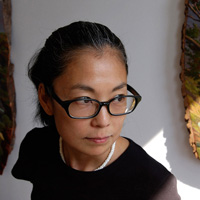

Alison Moritsugu was born and raised in Hawai‘i and left the islands after high school. She received a BFA from Washington University in St. Louis, Missouri and an MFA from the School of Visual Arts in New York. She lives and works in Beacon, NY.
Moritsugu’s work has been exhibited in solo shows at the Honolulu Museum of Art at First Hawaiian Center; Lux Art Institute, CA; Littlejohn Contemporary, NY; John Michael Kohler Arts Center, WI; and the Knoxville Museum of Art, TN. Group exhibitions include the Maier Museum of Art, VA; Palmer Museum, Penn State University, PA; Virginia Museum of Contemporary Art; Frost Art Museum at Florida International University; and Kemper Museum of Contemporary Art, MO. In 2011, Moritsugu completed a mosaic commission for the MTA Arts for Transit in New York City. She received a New York Foundation for the Arts Fellowship in painting and participated in residencies at the Cité International des Arts, Yaddo, The MacDowell Colony, and The Marie Walsh Sharpe Space Program. Her next solo show will be in May 2015 at Littlejohn Contemporary in New York.
Artist Statement:
In my log paintings, I examine the contrivances found in landscape paintings of the 18th and 19th centuries. These landscapes, by artists such as Albert Bierstadt and Frederic Edwin Church, were deeply rooted in the political constructs of the time and depicted the land as a bountiful Eden, a limitless frontier ripe for conquest. I take these images out of their familiar context, the framed canvas, and paint directly on wood slices with bark intact. These landscapes appear as an homage to the idyllic art of the Hudson River School yet, by viewing the painting’s surface, the cross section of a tree, any sense of nostalgia or celebration of nature is countered by the evidence of its destruction.
My work reveals how idealized images of the land shape our concept of the natural world – in essence, how our experiences are mediated by the mechanisms of art and culture. Painters throughout art history from the Northern Song, Baroque, Rococo and Hudson River School tailored their depictions of nature to serve an artistic narrative. Today, photoshopped images of verdant forests and unspoiled beaches invite us to vacation and sightsee, providing a false sense of assurance that the wilderness will always exist. By exploring idealized views of nature, my work acknowledges our more complex and precarious relationship with the environment.
Website
http://www.alisonmoritsugu.com/